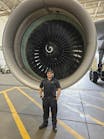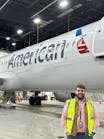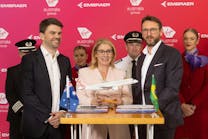RACCA Applauds Congressional Legislators for Pilot Safety Initiatives
Hyannis, Mass, July 5, 2017 – The Regional Air Cargo Carriers Association (RACCA) applauded efforts by Congressional legislators who are moving, as part of the Federal Aviation Administration (FAA) reauthorization legislation, to expand training options for pilots as part of an effort to improve safety and address the crisis facing small- and medium-sized communities and airlines resulting from the growing pilot shortage.
“This is a progress toward enhancing safety while addressing the pilot shortage which threatens the $121 billion in economic activity small- and medium-sized communities brings to local economies,” said RACCA President Stan Bernstein. “These communities have largely been ignored in the debate and it is heartening to know they are now being considered by legislators. The suggestions by Senator John Thune (R-SD) and Representatives Peter DeFazio (D-OR) and Sam Graves (R-MO) shows this is a bipartisan effort to save community air service while preserving aviation safety.”
Thune offered an amendment to the FAA reauthorization bill, passed by the Senate Commerce, Science and Transportation Committee, to expand the credit for pilot training beyond the college and military arena toward the 1,500 hours they need to take the right seat of a commercial aircraft.
“The amendment would allow prospective pilots to receive credit toward flight-hour requirements if taking structured and disciplined training courses if completion of those training courses will enhance safety more than unstructured accumulation of flight hours,” Thune said.
“This is a major advance in safety,” said RACCA Chair Tim Komberec. “During the recent World Training Conference chief pilots and airlines from legacy carriers to cargo operators reported on the deterioration of pilot skills that happens during the time between college graduation and being hired by an airline. This confirms concerns the industry has been raising for years that the 1,500-hour rule actually has had a negative impact on safety. Across the board these aviation professionals expressed deep concerns about the pilot shortage and how it will affect their hiring and their operations. We have to have new solutions that provide high-quality pilot training and hours building. These legislative moves show not only how important the issue is but how communities have been impacted.”
Thune called the pilot supply a “serious issue,” saying his amendment was modest but maintained a strong safety requirement. Representative Graves offered a similar amendment in the House reauthorization bill and DeFazio, who is an unbending advocate of aviation safety, noted questions raised by the Colgan accident that prompted the so-called 1,500-hour rule were on point since both pilots in that accident had many more hours than that required by the rule.
“There are people who have enough hours but who are incompetent,” said DeFazio, in a Politico report. “So, I think, at some point, we’ve got to take a really hard look at how we are testing and quantify real capabilities in terms of flying as opposed to just hours because, you know, someone can just go up and circle around in a plane and get hours.”
DeFazio stopped short of having Congress take on the task of dictating the definition of good training and called for an FAA review of training that assures a pilot is competent beyond simply hours. Both FAA and the National Transportation Safety Board have rejected minimum hours as an appropriate metric for determining the skill of a pilot.
The move comes after new training requirements were imposed by FAA in the wake of both regional and large carrier accidents that improves pilot capabilities during unusual flight regimes.


